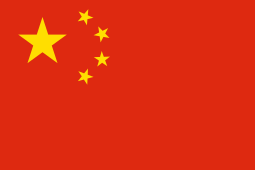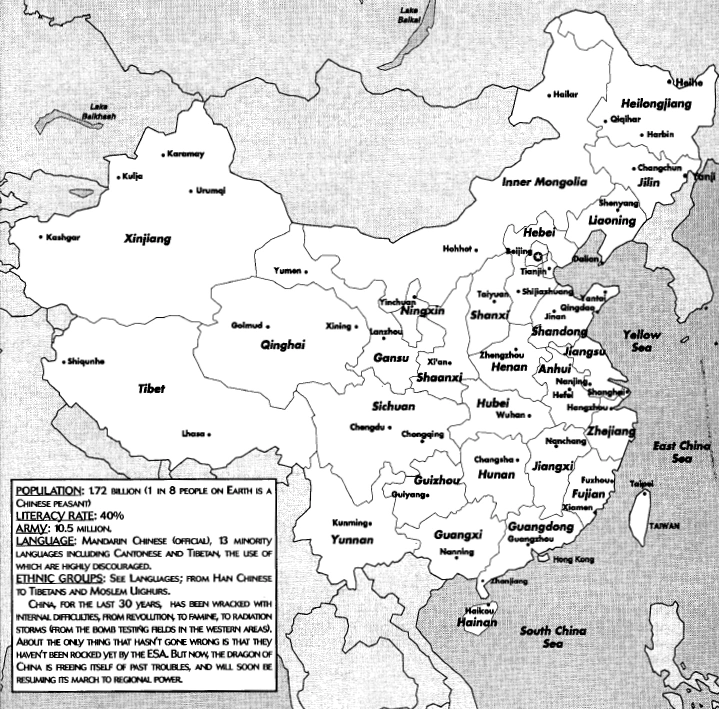China
Structure
China operates under the strict authority of the Chinese Communist Party (CCP), which serves as the supreme governing body. This party oversees two primary governmental organs: the Central Committee and the State Council. The Central Committee is responsible for enacting laws, formulating foreign policy, and maintaining direct control over the nation's military forces. In contrast, the State Council leads various ministries that manage crucial aspects of the country, including industrial development, national family planning policies, and internal domestic development.
Regarding law enforcement, China remains under a state of semi-martial law. The legal system is exceptionally stringent, with capital punishment meted out for a wide range of offenses, from murder to theft. Prisoners who escape execution are incarcerated in high-security prisons and labor camps. Weapon laws are equally severe; civilians are generally restricted to handguns with a maximum 10-round capacity and light body armor, and even these require a compelling justification for ownership. A particularly feared element of China's security apparatus is the Chinese Secret Police, known colloquially as the "Black House." This clandestine organization is tasked with monitoring for dissidents within China and conducting extensive international espionage. Rumors pervasive among the populace suggest that at least one "Black House" agent is embedded within every work group, and their presence is notably strong in several overseas "Chinatown" districts, maintaining surveillance far beyond China's borders.
The People's Liberation Army (PLA) forms China's military might, though it is distinctly divided into three main branches that tend to operate with minimal inter-branch coordination. The army constitutes the largest branch, its infantry forces bolstered by both light and heavy cavalry units. Additionally, the army deploys highly specialized 5-man elite squads, comprising the nation's finest soldiers equipped with top-tier weaponry, each member possessing a distinct combat specialty. China's navy is considered to be on par with other leading global powers, reflecting a strong maritime presence. However, its airforce is noted as lacking in capabilities compared to other major militaries, although the nation does possess nuclear weapons, providing a critical deterrent. The Chinese military maintains strong ties with the nation's corporate sector. A significant example of this is its partnership with Militech, which has resulted in the formation of the China CyberMilitary Manufacturing Co. Ltd. Beyond Militech, the PLA also collaborates with other prominent corporations such as Cheung Kong Holdings Ltd., Dai Lung, Kadar Holdings, and Shanghai Silks and Textiles. In fact, large-scale businesses in China are generally only permitted to operate as joint-scale ventures with the government, underscoring the deep integration of state and corporate interests. Adding to its capabilities, some of China's top military generals have received advanced training from Lazarus, a testament to the level of expertise within its command structure.
Culture
Chinese culture is a strict socialist caste system with five levels: Cadre, Military/Corporate, Artisan/Merchant, Peasant, and Refugee. Peasants make up most of the population and are forced to work in state-owned farms and factories. It’s important for the Chinese to put on a big face for tourists, even if they’re at the bottom of the social hierarchy. The people of China are also said to be superstitious
History
The nation was plunged into its Second Civil War starting in 1992, a direct consequence of the runaway success of Deng Xiaoping's reforms, which had fostered a deeply corrupt government and a predatory form of robber baron capitalism. In response, an ex-high school teacher named Hua Yuchi ignited a movement advocating a return to hardcore Maoism and an agrarian policy, quickly attracting two million followers, predominantly peasants. His Maoist Loyalist Cabal (MLC) launched an offensive against the government. By 1995, the MLC had successfully conquered Guangzhou, forcing the People's Liberation Army (PLA) to contend with a war on three fronts: a major Tibetan uprising in the west, Muslim extremists in the northwest (financially supported by the Soviet Union and its megacorp SovOil), and the MLC in the south, who had allied with the Khmer Rouge in Cambodia. In 1997, as Hong Kong was officially ceded to China by the United Kingdom, the MLC swiftly expanded into the new territories, sweeping through the countryside to Kowloon Bay. This encroachment led to widespread riots in Hong Kong by 1999, where the MLC engaged in direct conflict with both the powerful Triads and various corporate firms in the region. Martial law was declared shortly thereafter, prompting an alliance between the Triads and corporations, while the Neo-Hong Kong army reorganized to defend the city. A global wheat famine in 2002 exacerbated China's woes, particularly in the north, leading to a flood of refugees into the southern provinces. By 2005, the MLC had virtually seized control of all of southern China. Concurrently, the Second Corporate War raged in the South China Sea between SovOil and Petrochem, and China's internal chaos rendered it incapable of intervening to protect its interests in the disputed territories. In 2008, Taiwan, with significant backing from Japan, declared full independence, a move China was too embroiled in its Civil War to effectively counter. Fearful of an eventual MLC invasion, the Taiwanese government consequently hired Arasaka to plan and implement a defense force. A turning point arrived when China, under General Jiang Xiaxi, signed the China-U.S. Mutual Aid Pact. This agreement led to a joint-venture between Militech and CITIC, with the United States supplying China with much-needed arms and equipment. Several years later, in 2013, a decisive cyber strike team assassinated Hua Yuchi. Following his death, the PLA launched a rapid and successful campaign, liberating city after city and province after province. By 2014, the PLA had reclaimed all of southern China except for Hunan province, which remained the MLC's last stronghold. The uprisings in Tibet and Xinjiang had also been crushed, though underground cells of the MLC persisted. Immediately after Hua's assassination, the Neo-Hong Kong army swiftly advanced across Victoria Harbour, fighting through Kowloon. They discovered and leveraged existing pockets of resistance to the MLC within the city, eventually linking up with the PLA, who had successfully retaken Guangzhou. After liberation, the Neo-Hong Kong army's Gurkhas were privatized, the Triad-Corp alliance disbanded, and the region returned to its previous system of covert trade.
During the Fourth Corporate War (2021-2023), China's political stance was peculiar. The government harbored concerns about Arasaka's recruitment activities in Korea and Taiwan, fearing these troops might be used against either Militech assets within China or against China itself. However, these worries were largely overshadowed by the immense revenue generated from funding the war. China's space program flourished, turning a significant profit by selling satellite lifters to Arasaka for their extensive artillery and kill-satellite networks. Similarly, China's munitions industry boomed; despite Chinese weapons being considered inferior to their Japanese counterparts, they were often the only arms available during the widespread conflict, ensuring continuous demand and substantial profits.
By 2045, the Chinese government found itself exhausted by fierce battles on the Mongolian Plateau and in the South China Sea, both contested for access to their strategic resources. The nation had also not fully recovered from the devastating loss of Hong Kong, which had fallen victim to biological terrorism. The city itself became a grim testament to this, surrounded by a 100-foot wall erected by China to contain the lingering plague, and it had notably transformed into a stronghold for Alt Cunningham's digital Engram.
In 2077, China enacted a groundbreaking policy, becoming the first country to outright ban human-driven vehicles. The government mandated that only AI-driven automobiles would be issued, forcing citizens to dispose of their personal vehicles. Even personal bicycles owned by the public were not exempt, requiring government-issued tracking devices. In diplomatic developments, India signed a trade deal with China, aiming to strengthen relations between the two neighboring powers. Concurrently, a high-stakes competition unfolded between the Soviet Union and China to secure a major arms deal with Arasaka, an agreement that would severely disadvantage the losing country militarily. The Soviet Union's Secretary General specifically hired fixer Mikhail Akulov to spearhead these negotiations, with Akulov bringing Shelma along to monitor Chinese activity on the local Net, mask his true purpose in Night City, and keep tabs on the progress of China's own talks with Arasaka.




Comments